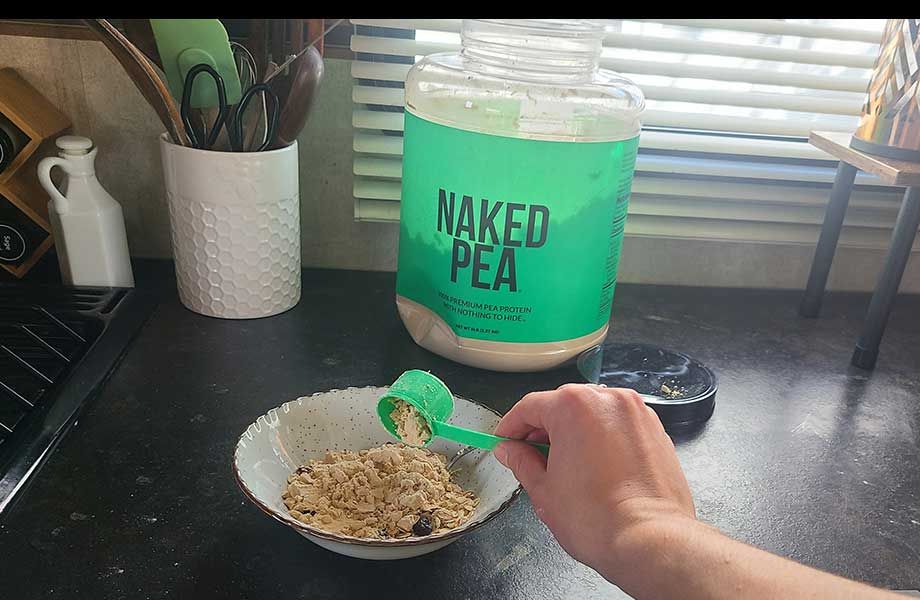We test and review fitness products based on an independent, multi-point methodology. If you use our links to purchase something, we may earn a commission. Read our disclosures.
It often seems that whey protein gets all the glory, with its numerous associated health benefits. However, whey protein might not be the ideal choice for everyone, especially if you’re someone who avoids animal products, has a milk allergy, or deals with lactose intolerance. In such cases, pea protein powder may be a more suitable option. This article delves into the numerous pea protein benefits to help you decide if it’s the best fit for you.
As a registered dietitian nutritionist, I’ll break down the nutrient content of pea protein powder to explain how it affects the body. I’ll compare it to other types of protein powders to demonstrate how it measures up in categories like amino acid content, digestibility, and ability to promote muscle protein synthesis. In doing so, you’ll have a comprehensive understanding of how pea protein powder can be a valuable addition to your diet.
Medical disclaimer: This article is intended for educational and informational purposes only. It is not intended as a substitute for medical advice. For health advice, contact a licensed healthcare provider.
What Is Pea Protein?
Pea protein is a plant-based protein created from yellow peas. It’s made by drying out the peas and then grinding them into a fine powder that contains mostly protein and starch. The powder then goes through an extraction process that removes the starch and other compounds, leaving behind primarily protein. The resulting pea protein powder can be further processed to achieve different purity levels and can be made into pea protein isolate or concentrate.
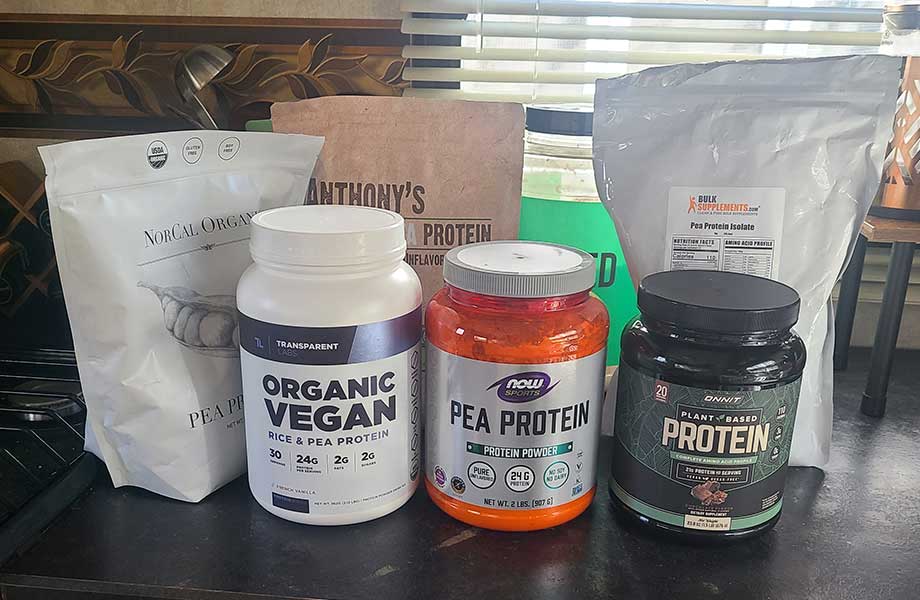
Many vegan protein powders contain a mix of plant-based proteins, including pea protein. Although pea protein is technically a complete protein, meaning it contains all nine essential amino acids, it’s low in methionine. Mixing pea protein with other plant-based proteins ensures the supplement contains sufficient amounts of all essential amino acids, the building blocks of protein necessary for building and repairing muscles.
Types of Pea Protein
Pea protein isolate and pea protein concentrate are the different types of pea protein. Both options are considered high-quality, but pea protein isolate stands out due to its higher protein content and minimal presence of other nutrients. In comparison, pea protein concentrate is less extensively filtered, containing a lower percentage of protein while retaining more starches, fiber, and sugars.
Pea protein isolate, being a highly concentrated protein source, often carries a more pronounced pea flavor. It’s also usually more expensive because it requires more processing than pea protein concentrate. Pea protein isolate may be more suitable for those taking a protein supplement solely to increase their protein intake without the added consumption of carbs.
On the other hand, pea protein concentrate has a milder flavor, which may be preferred if you dislike the taste of peas. It’s the more budget-friendly option because it undergoes less processing. Furthermore, pea protein concentrate provides a range of nutrients beneficial to health, with a notable emphasis on fiber. Fiber can help reduce cholesterol levels and manage blood glucose. Pea protein concentrate may appeal to those wanting an affordable plant protein supplement with other beneficial nutrients.
How Much Protein Is in Pea Protein?
The amount of protein in pea protein powder will vary depending on the brand and product. However, a typical serving size for pea protein powder is around 20 to 30 grams, which usually provides between 20 to 30 grams of protein. Here is the protein content per serving for a few different pea protein supplements:
- Naked Nutrition Pea Protein: 27 grams
- Ritual Essential Protein Daily Shake 18+: 20 grams
- Bulk Supplements Pea Protein Isolate: 21 grams
- NOW Sports Nutrition Pea Protein: 24 grams
Pea Protein Benefits
Whether you’re vegan or not, pea protein powder offers several benefits that other protein powders don’t always provide. Here are just a few of the many benefits of pea protein powder.
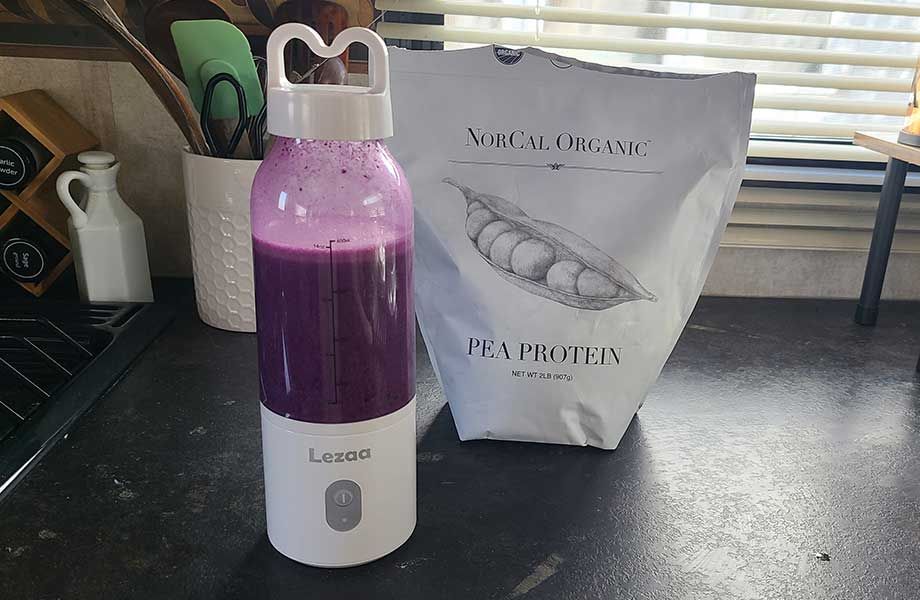
Plant-Based Protein Source
Pea protein powder is derived from peas, making it a plant-based protein option. Plant-based protein is suitable for vegans, vegetarians, and individuals wanting to reduce their consumption of animal products. Plant-based protein powders, such as pea protein, are often lower in fat and cholesterol and higher in fiber, making them suitable for heart health. They also tend to be higher in antioxidants, which can help reduce inflammation.
It’s a Complete Protein
Pea protein is one of very few complete plant-based protein sources. As mentioned previously, this means it contains all nine essential amino acids. Your body doesn’t make these amino acids, and you must consume them through your diet. Included in the essential amino acids are the branched-chain amino acids (leucine, isoleucine, valine), which are particularly important for muscle growth and repair.
Pea protein is low in the amino acid methionine, but you can mediate that by consuming a variety of plant-based protein sources. Nuts, soy, and beans are foods rich in methionine that complement a plant-based diet.
Free of Common Allergens
Pea protein is free of common food allergens, such as wheat, soy, and dairy. This attribute makes it a suitable choice for individuals unable to tolerate soy or whey protein due to allergies. Pea protein powder offers an option for those with food allergies to fulfill their protein needs while reducing the likelihood of an allergic reaction.
Easy to Digest
Pea protein is generally well-tolerated, causing fewer side effects than whey or casein protein. Milk proteins contain lactose, a sugar in milk that some individuals are not able to properly digest. Someone who’s lactose intolerant may experience digestive issues like bloating, gas, diarrhea, abdominal pain, or nausea when they consume lactose. Pea protein is likely to be gentle on the stomach, even for those with food sensitivities.
Weight Management
Increasing your protein intake with pea protein powder could help promote weight loss. A higher protein intake is needed to gain muscle. Increased muscle mass raises metabolism, meaning you burn more calories throughout the day.
Furthermore, protein has a higher thermic effect of food (TEF) than carbohydrates and fat. Your body burns more calories when digesting and metabolizing protein than other nutrients. Finally, protein improves feelings of satiety, so you may find yourself less likely to overeat.
RELATED: Best Protein Powder for Weight Loss
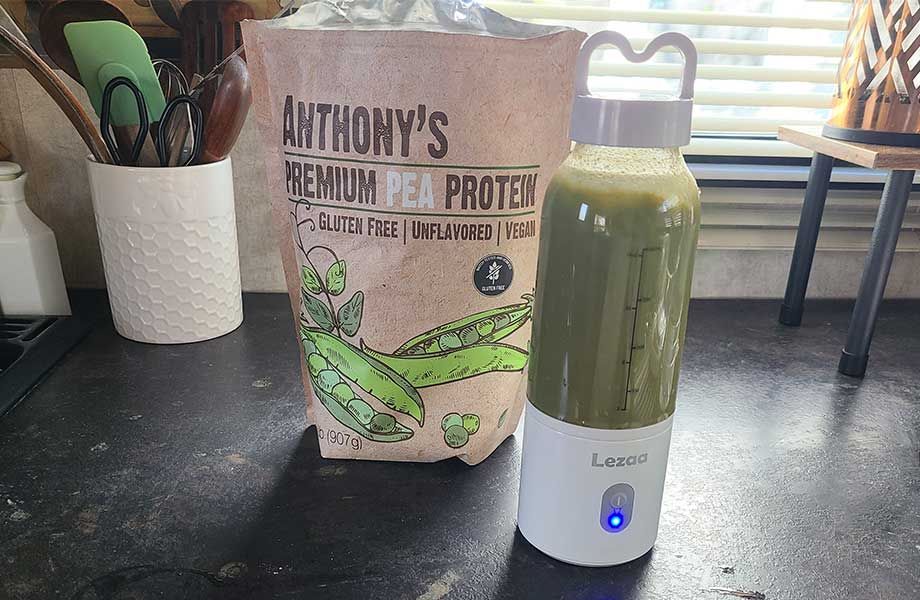
Muscle Building
Building muscle requires considerably more protein than what’s needed for maintenance. It’s theorized that increasing protein results in a positive net protein balance, contributing to increased muscle protein synthesis and muscle mass. To maximize the muscle-building benefits of pea protein powder, use it in conjunction with a consistent strength training routine and a well-rounded diet.
Sustainability
The production of pea protein utilizes more sustainable, efficient agricultural practices and reduced resource consumption compared to animal-based protein powders. Pea plants typically require less water and land, and they have a lower carbon footprint compared to raising livestock needed for milk proteins. Choosing pea protein can be a step toward a more eco-friendly and sustainable diet.
RELATED: Benefits of Protein
Pea Protein vs Whey Protein
Pea and whey protein have several commonalities and differences. Let’s compare their amino acid profiles, digestibility, allergens, and other factors.
RELATED: Pea Protein vs Whey
Source
Pea protein is derived from yellow peas and whey protein is derived from milk. Pea protein aligns with plant-based and vegan diets, while whey, being an animal-based protein, is not vegan-friendly. With these origins in mind, you can make informed choices that best suit your dietary preferences and values.
Nutrients
Pea and whey protein powders are both rich in protein content (~20 to 30 grams per serving), but whey protein typically has a slightly higher amount. Both are typically low in sugar, fat, and starch. Notably, pea protein is richer in fiber and iron, while whey, made from milk, may provide more calcium and potassium.
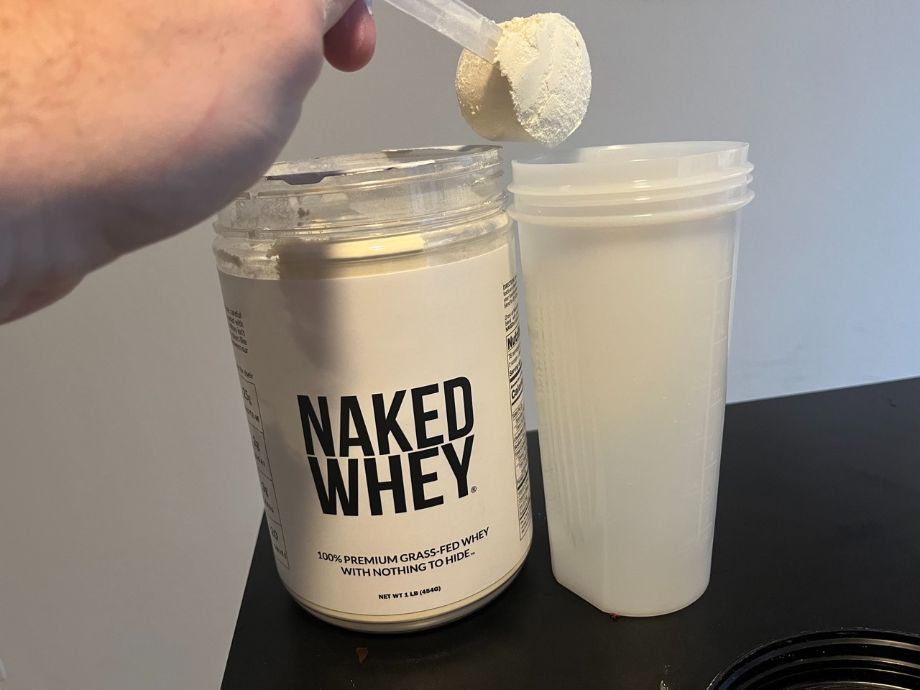
Amino Acid Profiles
Both pea protein and whey protein contain all nine essential amino acids the human body can’t produce on its own. Whey protein is higher in leucine1, a BCAA known to stimulate muscle protein synthesis more than the other essential amino acids. On the other hand, pea protein is higher in arginine (a non-essential amino acid) than whey protein. Arginine is important for nitric oxide production, which helps relax blood vessels, improve circulation, and reduce blood pressure.
RELATED: Best BCAA Supplements
Effectiveness
Many athletes take protein powder to help meet their increased protein needs for repairing and building muscle mass. One 2019 study2 found the ingestion of whey and pea protein produced similar outcomes in measurements of body composition, muscle thickness, force production, exercise performance, and strength after 8 weeks of training for 15 men and women.
A larger 2020 study3 involving 92 participants resulted in comparable findings, showing no noteworthy differences in fitness performance and post-workout muscle soreness between the whey and pea protein groups.
How to Pick the Best Pea Protein Powder
Choosing the optimal pea protein powder requires evaluating several factors to ensure it aligns with your needs. Here are some key considerations to keep in mind.
- Protein Content: Look for pea protein powders with a high protein content. Pea protein isolate is a concentrated option and is likely to have more grams of protein in each scoop. Consider a pea protein powder with 20-30 grams per serving.
- Allergen Information: Pea protein itself is usually free of common food allergens. However, pea protein is often mixed with other plant-based protein sources like soy and brown rice protein. Soy, gluten, and dairy are common in protein powders, so always check the label if you have a food allergy.
- Nutrient Content: Aside from protein, check the label for fat and added sugar. If you are limiting these, be sure to choose a product with less than 5 percent of the daily value of these nutrients.
- Certifications: Depending on your dietary preferences, look for certifications that indicate the product is vegan, organic, gluten-free, or made without GMOs. Give priority to protein powders that are third-party certified to ensure it’s a product of high quality and purity.
- Cost: Compare prices among different products to ensure you find one that fits into your budget.
- Customer Reviews: Read customer reviews on the company websites to see how others rate the taste and solubility of each supplement when used in a protein shake.
Pea Protein Benefits: Final Thoughts
As a complete plant-based protein source, pea protein caters to the needs of vegetarians, vegans, and those wanting to reduce their intake of animal-based products. Pea protein has earned its place as a nutritious and eco-conscious choice for those seeking an effective, plant-based protein supplement for muscle growth or weight loss.
- Pea protein is free of lactose, making it easier to digest for those who are lactose intolerant
- Generally soy-, gluten-, and dairy-free, pea protein doesn’t contain common food allergens in other types of protein powders
- Contains all nine essential amino acids, including branched-chain amino acids, for muscle repair and growth
Pea Protein Benefits: FAQs
What does pea protein do for the body?
Pea protein provides the body with essential amino acids for muscle repair, growth, and recovery. It can also aid in weight management by improving satiety and boosting metabolism.
Is it OK to have pea protein every day?
Yes, it’s generally OK to have pea protein daily. Check with your healthcare provider before starting a new supplement to ensure it’s safe for you.
Is pea protein good for gut health?
Peas are rich in dietary fiber, which is essential for a healthy gut as it supports regular bowel movements and provides nourishment for beneficial gut bacteria. Pea protein powder isn’t as rich in fiber as whole peas, but may still contain fiber that contributes to your overall daily intake.
What are the drawbacks of pea protein?
Pea protein is a complete protein but contains smaller amounts of leucine, a BCAA known to stimulate muscle protein synthesis, than whey protein. Additionally, not everyone likes the earthy taste and texture of pea protein.
These statements have not been evaluated by the Food and Drug Administration. This product is not intended to diagnose, treat, cure, or prevent any diseases.
References
- Jäger, R., Kerksick, CM., Campbell, BI., et al. National Society of Sports Nutrition Position Stand: protein and exercise. J Int Soc Sports Nutr. 2017;14:20. doi:10.1186/s12970-017-0177-8
- Banaszek A, Townsend JR, Bender D, Vantrease WC, Marshall AC, Johnson KD. The Effects of Whey vs. Pea Protein on Physical Adaptations Following 8-Weeks of High-Intensity Functional Training (HIFT): A Pilot Study. Sports (Basel). 2019;7(1):12. Published 2019 Jan 4. doi:10.3390/sports7010012
- Nieman DC, Zwetsloot KA, Simonson AJ, et al. Effects of Whey and Pea Protein Supplementation on Post-Eccentric Exercise Muscle Damage: A Randomized Trial. Nutrients. 2020;12(8):2382. Published 2020 Aug 9. doi:10.3390/nu12082382
Further reading

These bumpers are IWF-certified for the competition stage, but are they worth the space in your home gym? Find out in our Rogue Competition Bumpers review. Read more

In this Bowflex TC1000 TreadClimber review, I’ll go into detail about what I really think about this wacky cardio machine. Read more

Our Exerpeutic elliptical review covers all of the need-to-know details about this budget-friendly cardio machine. Read more

Compared to the regular deadlift, the trap-bar deadlift works your quads more, and lowers your risk of getting injured. A trainer explains how to do it. Read more

